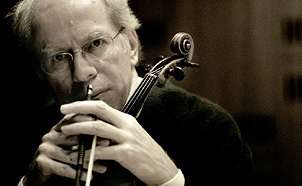|
Back
Prom 37: Glass, Old and New London
Royal Albert Hall
08/12/2009 -
Philip Glass: Violin Concerto – Symphony No.7 “A Toltec Symphony” (UK premiere)
Gidon Kremer (violin)
BBC Symphony Chorus, BBC Scottish Symphony Orchestra, Dennis Russell Davies (conductor)

G. Kremer (© Kasskara/ECM Records)
There is always a special atmosphere at Late Night Proms. Starting after 10pm, they tend to have a relaxed, laid-back feel, and although generally less well-attended than those occurring at a more conventional hour, attract the devoted fans of the non-mainstream composers featured. Of course, in this case, it would be a stretch to describe Philip Glass as non-mainstream, as, particularly thanks to his film scores, he is probably one of the most famous and instantly identifiable of contemporary composers – a fact reflected in the high turnout to hear this performance. However, minimalism has not been featured heavily at The Proms, and this is the first time they have devoted a concert to Glass's works. In a special bonus for fans, the 72 year old composer himself attended the concert, and appeared on stage at the start. Welcomed warmly, Glass spoke for a few minutes about the Violin Concerto, historically one of his most popular works (and which should now properly be called the Violin Concerto No. 1, as a second has recently been composed, and will receive its UK premiere next year). Telling of how the piece was dedicated to his deceased father, who had a particular affection for violin concertos, he added “When I was asked to write a violin concerto I decided to do a piece that I thought he would like, and I hope I succeeded; there seem to be a lot of fathers who like it, so..!”
The (First) Violin Concerto (1987) is a piece of vintage Glass, containing many “trademark” features from the start, including swaying syncopated rhythms, shifts back and forth between the tonic minor and major chords, and overlaying of triplet and duplet patterns. Rather than utilising a classical concerto model of soloist battling against orchestra, the violin simply emerges from the orchestra, sometimes decorating, sometimes leading with new themes which the orchestra follows. This should not, however, give the impression that the work is undemanding for the soloist; distinguished veteran violinist Gidon Kremer was playing for a great deal of the time, but always with ease and an undemonstrative energy and quiet physicality. He sounded at his best when allowed to broaden out his tone with longer soaring lines above the orchestra, or rich sustained double-stopped chords. Although taken slower than is perhaps usual, the chaconne-form second movement was serene and meditative, and contrasted well with the spinning dance of the third and final movement.
Conductor Dennis Russell Davies is a long-time champion of Glass's music (and in fact the dedicatee of his Fifth Symphony) and his enthusiasm and confidence with the genre was very clear. The orchestra responded with the extremely high level of rhythmic and intonational precision required to make minimalist compositions work. My only criticism is of the balance between sections, in which some instruments were unduly submerged (e.g. the reeds) and others over-prominent (in particular an irritating triangle tinging away loudly and distractingly).
The concert continued with Glass's Seventh Symphony (2005), being performed for the first time in the UK. Subtitled “A Toltec Symphony”, it was inspired by the ancient Mesoamerican Toltec culture, which emphasised spiritual development and relationship with nature, along with skills such as mathematics and architecture. The three movements of the symphony are named after a trinity of religious concepts: the corn goddess (I The Corn), the hallucinogenic peyote root (II The Sacred Root), and the symbolic keeper of the Book of Knowledge (III The Blue Deer). Starting with short hesitant woodwind phrases, and using more varied harmony than the Violin Concerto, the Symphony is not as immediately recognisable as Glass. However, as the layers build and the phrases become longer, a more familiar identity emerges. Although this work has been described as unprogrammatic, the growth of the first movement is quite organic, and could easily be imagined to represent the path from first shoots to huge sweeping cornfields. The addition of extra percussion instruments (such as rattle, tom-tom, woodblock and xylophones) gave a slight Latin American tint to the music, as did the featured solo trumpet (played with a lazy, sunny legato feel by Mark O'Keeffe).
If the first movement had a filmic quality to it, this was enhanced in the second by the addition of chanted chord syllables from the chorus (according to Glass, transcribed from the singing of an old man he once met while climbing in the Mexican mountains), and somewhat reminiscent of the Qatsi trilogy. Again, the harmony was quite chromatic, but the dissonances were often produced by the superimposition of two independently tonal chords, usually in the chorus parts. The third and final movement, while harmonically and texturally back in the familiar Glass territory of long wind/brass lines over repeated string chords, had the interesting characteristic of being interspersed with unexpected general pause bars of complete silence. This was a feature particularly effective in the huge space of the Royal Albert Hall; when one of these pauses occurred during a period of loud dynamic which included the organ and timpani, the sound reverberated around the hall for some time. However, despite the volume and heavy textures occurring at times, the piece ends in peace and tranquility. The reception of this new piece by the Proms audience was generally very positive. A lone voice from the circle was heard (somewhat uncharitably) booing, but this was quickly drowned by increased applause and whoops from the rest of the hall.
Carla Finesilver
|